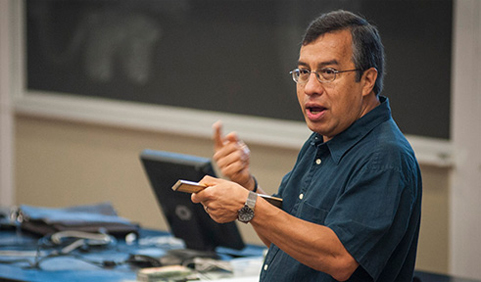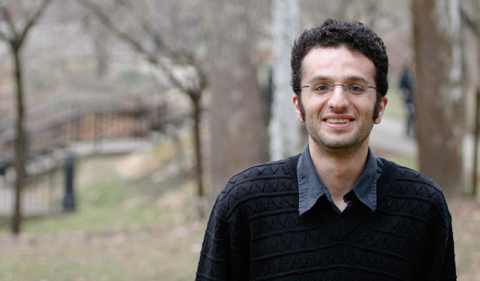
Dr. Sergio Ulloa
By Angela Woodward
From Compass
Securing research funding is, for many, a nearly all-day, every-day process as faculty are constantly thinking of new concepts and experiments to be explored and applications of theories to be implemented – all in the midst of their primary teaching duties.
“It all starts with having good ideas,” explained Dr. David Ingram, Professor and Chair of Physics & Astronomy, who has secured a number of research grants in his 28-plus years at Ohio University and is currently grant funded. “And you need to know which funding agencies are liable to support research in those good ideas areas.”
Networking and relationship building with these agencies can often be helpful.
“Securing funding is a challenge,” said Dr. Sergio Ulloa, a professor of physics and astronomy who is about to complete his 31st year at Ohio University. “When I first came here, I had some really good advice on what to do.”
Early in his years as a professor, Ulloa traveled to Washington, D.C., to meet with representatives from federal agencies known as reliable funding sources. A year after joining the team of faculty in the Physics & Astronomy Department, Ulloa received his first federally funded research grant. His research efforts have continued to be funded ever since, and he is currently in the second year of a three-year grant from the National Science Foundation.
“I think especially when you’re a young professor, you need to understand a little bit how the whole research enterprise works,” he said. “So it’s useful to go to the funding agencies.”
Securing research funding also requires working with an Ohio University office dedicated to assisting faculty through the funding-seeking process.
OHIO’s Office of Research and Sponsored Programs staffs four managers of sponsored programs who serve as support staff for faculty in their efforts to seek, secure and manage extramural funding in the most accurate and efficient way.
Judi Rioch, a certified research administrator who has been employed at Ohio University for more than 30 years and has spent the past 11 years in the Office of Research and Sponsored Programs, has worked closely with the OHIO’s physics and astronomy faculty as a manager of sponsored programs.
According to Rioch, most of OHIO’s research funding proposals are written in response to a specific request for proposals, a funding opportunity announcement, or some kind of solicitation. Rioch’s motto is “Call early. Call often.”
“I tell the faculty I work with, even if you have a dream that you’re going to submit a funding proposal, I want to know about it the next morning,” she said. “The more advance notice they give me, the better I can help them.”
When a faculty member approaches the office about submitting a funding proposal, staff within the office set into a motion a series of tasks – from reviewing the funding opportunity guidelines and helping the faculty member develop a budget for the grant to facilitating the completion of the grant forms and documents and securing the necessary institutional signatures required for the proposal’s submission letter and, in many cases, submitting the final proposal to the funding agency.
“We do not do the technical writing,” Rioch said.
That part of the process falls directly on the faculty member seeking the funding.
“A critical part of the process is writing the funding proposals – and being prepared to write many proposals before you get funded,” Dr. Ingram said.
“We do it all the time,” Ulloa said of writing funding proposals, noting that he is both currently funded and pursuing additional funding opportunities. “You’re always thinking about the next idea.… You’re reading scholarly publications and going to conferences, which leads you to adjust your ideas or come up with new ideas. In a sense, you are always preparing your next proposal.”
Most of the federal funding agencies rely on a peer-review system, either by individuals or panels of individuals, to determine the funding recipients.
“It’s very competitive,” explained Dr. Carl Brune, Professor of Physics & Astronomy. “These reviewers have probably received several times the number of applications as they have money to fund, so they have some hard decisions to make. … Whether or not you are successful depends on a lot of things. Part of it is how good your ideas are. Part of it is how stiff the competition is. Part of it is how much money the agency actually has.”
Waiting to find out whether you’ve been funded can take anywhere from six months to more than a year. If and when a faculty member receives word that they’ve been funded, that’s when the workload really kicks in.
“The research aside, there are deadlines that have to be met, progress reports to be written and budgeting to be implemented,” Brune said, noting the role research staff within the department and support staff within the Office of the Vice President for Research and Creativity Activity play in the process.
The Office of Research and Sponsored Programs is also responsible for the non-financial post-award functions in the research funding process.
“Once the award comes in, we will review that award to make sure it does not deviate too much from what we proposed and help the principal investigator make any adjustments to the budget,” explained Mo Valentine, the office’s assistant vice president for research and sponsored programs who joined OHIO in October 2015. “If they have to make an adjustment to the budget or even the scope of work, we will help them do that, and then get the award prepared for account set-up.”
“We’ll also review any terms and conditions of the award to make sure we can accept them,” added Rioch. “If there are some we cannot accept, then we’ll negotiate on behalf of the University.”
During the course of the funding period – for federal funding, often three years – the office also assists in securing any approvals needed from the funding agency.
“Judi and the other managers are content experts when it comes to what you can and cannot do on the project when it’s been awarded,” Valentine said. “We are the regulatory arm of the University’s research funding, so we have to not only be able to make sure we’re doing everything correctly by the book, but also efficiently.”
“All of these people are putting in quite a lot of effort to make sure that i’s are dotted and t’s are crossed, and certainly there is a lot of oversight in terms of how the money is spent and a lot of managing going on,” said Brune. “The University’s research infrastructure is an important piece of the whole enterprise.”



















Comments